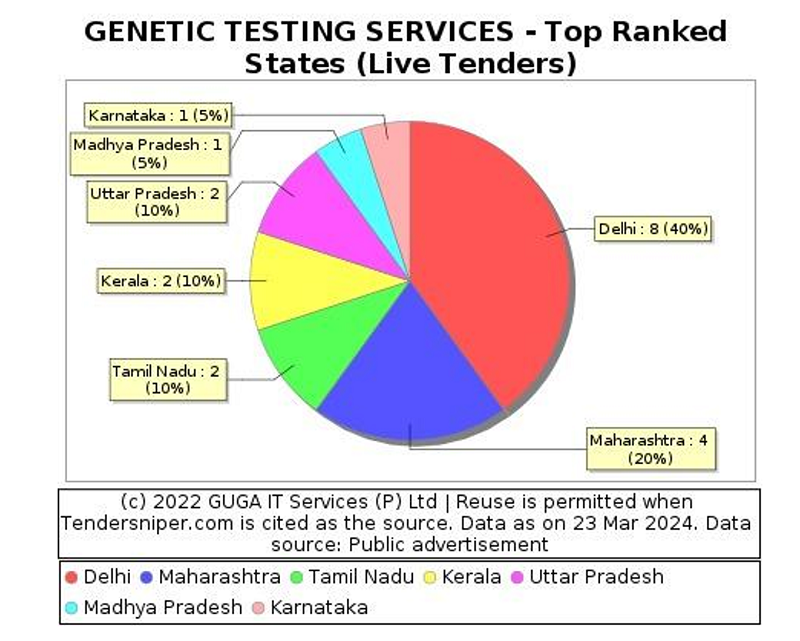Introduction: Medical Science is experiencing a massive demand in the country as the country is home to close to 1.4 billion people. Thus, each medical department is required to embrace a must needed pivot to integrate technology in each possible sector to enhance efficiency and accuracy. That is the reason why each and every state in the country is undergoing some massive development planning to step up their medical offerings. Herein, the Genetics department is one of the most important pillars in the modern medical paradigm and thus a massive surge of genetic testing tenders had been seen throughout the year of 2023. These issued tenders include procurements like Genetic testing tenders, DNA sequencing services tenders etc. Therefore, the article aims to highlight all the details of genetic testing related tenders that had been issued in the previous year by deep diving in the annual analytics, closely reviewing genetic testing tenders, DNA sequencing services tenders and analysing the live tenders.
Annual Analytics: The annual analytics of tender data involves examining patterns and trends in the procurement practices of various states and government organisations. It includes examining factors like number of tenders issued, industries involved, the distribution of locations, and the amount of contracts awarded in a given period of time, usually on an annual basis. In the years 2023-24, Maharashtra, Delhi and Assam have all released the most number of tenders in the fields of genomic analysis services, out of all the states. In terms of agencies, Indian Council of Agricultural Research of Maharashtra, Department of Defence of Delhi and Indian Council of Medical Research of Delhi have issued 101, 88 amd 65 tenders respectively making them the top contenders while Ministry of Human Resource and Development of Delhi and All India Institute of Medical Sciences Delhi of Maharashtra are just slightly behind having issued 49 and 31 tenders respectively. Some other notable agencies which are closely behind are the All India Institute of Medical Sciences Delhi of Karnataka, Department of Defence (Telangana) and Council of Scientific and Industrial Research of Kerala with tender counts of 26, 21 and 18 respectively. Out of all the states, Maharashtra released the highest number of tenders i.e., 254 followed by Delhi with 139 and Assam with 61 tender releases. The remaining states altogether made contributions of 380 tenders.
Genetic testing tenders: The genetic testing tenders issued in the last year portray a wide range of requirements and applications in and across various industries and institutions. These tenders are proofs that the requirement of genetic testing services in various fields and uses, like genetic diversity analysis, next-generation sequencing (NGS), and also Sanger sequencing are rapidly increasing. The tender released by The University of Calcutta for the Quotation for PCR products’ sequencing services (Sanger technology) with gel extraction purification is an example of the needs for genetic analysis services and equipment in the academic sector. Similarly, the tender for a broad range of genetic testing released by the Public Health and Family Welfare department of Madhya Pradesh emphasises on the significance of genetic analysis in medical education and healthcare. Additionally, the Indian Army also released a tender for genetic testing, which includes germline and somatic testing using RNA transcriptomics. This is a proof of the military and armed force’s interest in applying cutting-edge genetic technologies for a range of applications, most likely including medical research and personnel screening. On the other hand, tenders from agencies such as the Department of Health and Family Welfare and the Indian Council of Agricultural Research shed light on the wider societal effects of genetic testing, which include public health programs, agricultural research, and biodiversity preservation. As a whole, the genetic testing tenders highlight how the value of genetic analysis is becoming more and more recognized in various fields and domains which in fact reflects a bigger trend towards integrating genomic technologies in different fields for research, healthcare and decision making purposes.
DNA sequencing services tenders: The DNA sequencing services tenders issued in 2023 highlights a diverse need and integration in the genetic department of the country. Prominent institutions like JIPMER and AIIMS Delhi issued tenders for DNA sequencing to improve medical research and diagnostics services as the medical department is experiencing demands for limited and high-depth sequencing services. Similarly, organisations like ICAR and DST issued tenders related to DNA sequencing to improvise agricultural research metrics, improve medical studies and advancement of biodiversity conservation that covers a wide range of genomes from plants, animals to microbes. Additionally, Military Engineer Services of Karnataka issued a tender worth 3 Lakh rupees for Calibration of the Capillary DNA Sequencer 3500. Furthermore, well-known entities like Burdwan University issued tenders to improve DNA sequencing platforms and library preparation kits. Although there is no estimated cost of most of these tenders, it still doesn’t fail to show the commitment of the country in enhancing the genetic medical department facilities.
Live Tender Analysis: The live tender analysis helps to deduce the interesting fact that most of the tenders were issued by the country capital Delhi which accounts to 40% of the total tender releases. Maharashtra comes second in this regard by issuing 20% of the total tenders related to Genetic Testing Services. Uttar Pradesh, Kerala and Tamil Nadu follow the list by accounting for 10% each of the net tender releases. Rest of the tenders were issued by Madhya Pradesh and Karnataka as both of the states issued 5% of the net issued tenders each.

Conclusion: In conclusion, India is on the right track to foster its genetic medical department. In 2023, various companies across the country issued a total of 417 tenders. Which means not only the metro cities, but many remote areas of the country are equally eager to streamline their genetic department. Although the tender releases were mostly skewed towards Delhi, Maharashtra and other places with emerging metro cities, involvement of union territories like Andaman and Nicobar Islands and Puducherry in these tender releases shows a promise to improve the medical facilities of the nation.


